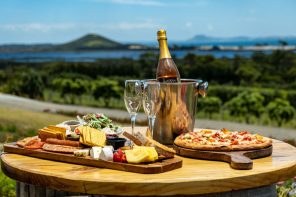According to the United Nations Office on Drugs and Crime, New Zealand ranks seventh in the world on per capita cannabis use. The Government passed its medicinal cannabis bill last year and has announced a binding referendum on the legalisation of cannabis to be held alongside the 2020 election. In the event of cannabis legalisation, how will we see restaurants and cafés evolve?
Is it stands in New Zealand recreational cannabis is illegal, although the police often won’t prosecute if the amount found in possession is small. However, with the progressive Labour-Green government, recreational cannabis reform seems to now be a question of when, not if.
“We’ve had countless opinion polls for decades now, confirming New Zealanders are positively well ahead of political action on the issue of cannabis law reform,” said Green Party drug law reform spokesperson Chloe Swarbrick. “This binding referendum presents an opportunity to have the will of the people trigger meaningful legislative change.”
Smoking tobacco in all indoor workplaces, including bars and restaurants, has been illegal in New Zealand since 2004. If recreational cannabis is legalised, it is unlikely to result in the proliferation of smoking lounges as seen in Amsterdam. The impact on New Zealand’s hospitality industry, if the examples of Canada and California are anything to go by, will be largely positive, with the most notable change being the addition of cannabis-infused food items to the menu.
Cannabis edibles are expected to be a $4.1 billion-dollar industry by 2022, according to a report from Arcview Market Research. In Colorado, edibles increased at a compound annual rate of 35 percent between 2014 and 2018.
“The edibles market is up for grabs,” the report stated. “We’re already seeing mainstream beverage companies scrambling to take advantage of part of this significant opportunity. When you consider that the investments made so far by these beverage companies, touches primarily the beverages subcategory, then you start to get a sense of the magnitude of the overall edibles market.”
With Millennials having been blamed variously over the years for killing the diamond industry, the wedding industry, the mayonnaise industry and the razor market, it could genuinely be argued that with the legalisation of cannabis, Millennials could create a significant dent in the bar industry. A study commissioned by Southern California cannabis company OutCo found that Millennials were the most likely to make the switch between drinking alcohol and smoking cannabis. Up to 34 percent of millennials said they would opt for a joint over a beer.
“We found that for millennials, the choice between the two main recreational substances, alcohol and tobacco, has always been an easy one,” said OutCo CEO Lincoln Fish. “Growing up with anti-tobacco messaging, the smoking rate for 18—29-year-olds in the U.S. has dropped by 22 percent over the past decade, leaving alcohol as the substance of choice. But we are already seeing a decrease in alcohol sales, which means that cannabis is poised to be the new recreational substance of choice for many millennials and beyond.”
Furthermore, the potential for ‘weed tourism’ is also high. ‘Wine and weed’ tours are taking off in California, and Colorado has also seen a boost in tourism numbers since legalising cannabis for recreational purposes in 2012, more than a 50 percent increase since 2014. According to research carried out in Amsterdam, up to 30 percent of tourists are drawn to the city for its ‘coffeeshops’, where cannabis is sold openly. Contrary to popular belief, cannabis is not legal in Amsterdam or any part of the Netherlands. Instead, there is a policy of limited enforcement, where the sale of cannabis is tolerated at licensed venues. Although New Zealand is relatively isolated, Australia could be a large market for cannabis tourism as cannabis in Australia is only available for medicinal use.
Notably, given the reputation of cannabis for increasing appetite, studies conducted in California and Colorado found that there was no increase in fast food sales across the board after recreational legalisation. However, clever QSR operators could take advantage of the so-called ‘munchies’ with targeted campaigns.
There are still too many unknowns surrounding the legalisation of cannabis in New Zealand to make a definitive call on just how it will affect the hospitality industry, but for many it will offer a chance to tap into a new market, and may play a significant role in bringing tourists to New Zealand in the first place.






